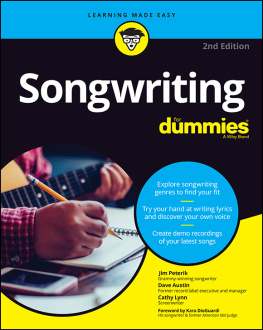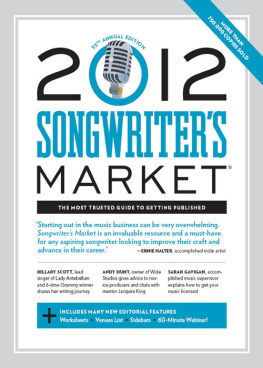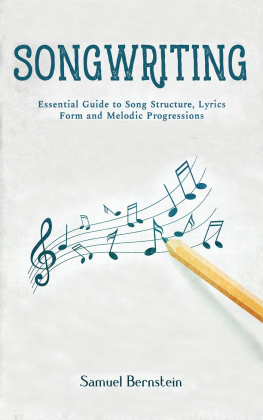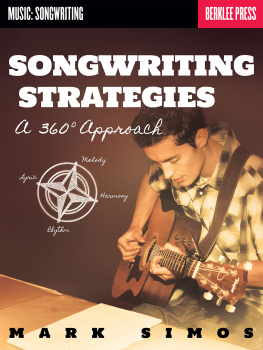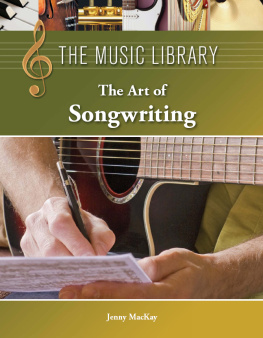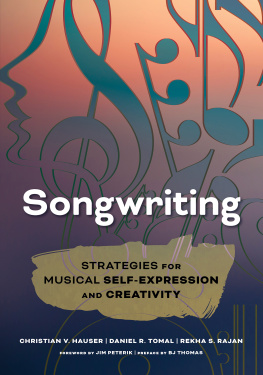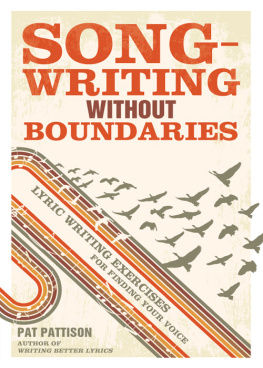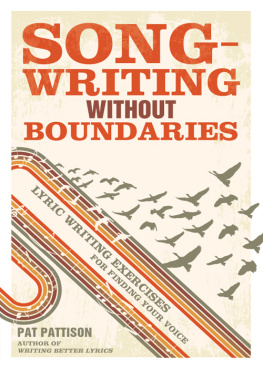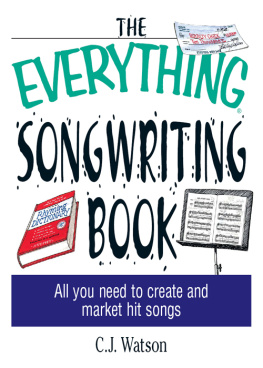
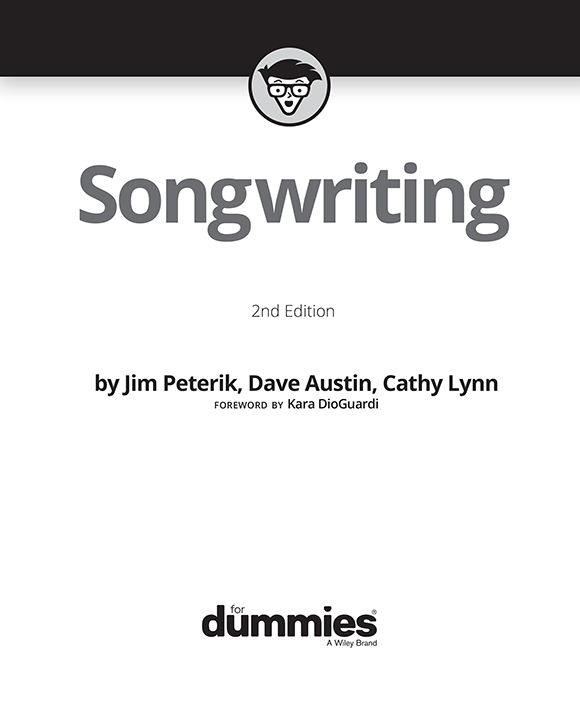
Songwriting For Dummies, 2nd Edition
Published by: John Wiley & Sons, Inc., 111 River Street, Hoboken, NJ 07030-5774, www.wiley.com
Copyright 2020 by John Wiley & Sons, Inc., Hoboken, New Jersey
Published simultaneously in Canada
No part of this publication may be reproduced, stored in a retrieval system or transmitted in any form or by any means, electronic, mechanical, photocopying, recording, scanning or otherwise, except as permitted under Sections 107 or 108 of the 1976 United States Copyright Act, without the prior written permission of the Publisher. Requests to the Publisher for permission should be addressed to the Permissions Department, John Wiley & Sons, Inc., 111 River Street, Hoboken, NJ 07030, (201) 748-6011, fax (201) 748-6008, or online at http://www.wiley.com/go/permissions .
Trademarks: Wiley, For Dummies, the Dummies Man logo, Dummies.com, Making Everything Easier, and related trade dress are trademarks or registered trademarks of John Wiley & Sons, Inc., and may not be used without written permission. All other trademarks are the property of their respective owners. John Wiley & Sons, Inc., is not associated with any product or vendor mentioned in this book.
LIMIT OF LIABILITY/DISCLAIMER OF WARRANTY: THE PUBLISHER AND THE AUTHOR MAKE NO REPRESENTATIONS OR WARRANTIES WITH RESPECT TO THE ACCURACY OR COMPLETENESS OF THE CONTENTS OF THIS WORK AND SPECIFICALLY DISCLAIM ALL WARRANTIES, INCLUDING WITHOUT LIMITATION WARRANTIES OF FITNESS FOR A PARTICULAR PURPOSE. NO WARRANTY MAY BE CREATED OR EXTENDED BY SALES OR PROMOTIONAL MATERIALS. THE ADVICE AND STRATEGIES CONTAINED HEREIN MAY NOT BE SUITABLE FOR EVERY SITUATION. THIS WORK IS SOLD WITH THE UNDERSTANDING THAT THE PUBLISHER IS NOT ENGAGED IN RENDERING LEGAL, ACCOUNTING, OR OTHER PROFESSIONAL SERVICES. IF PROFESSIONAL ASSISTANCE IS REQUIRED, THE SERVICES OF A COMPETENT PROFESSIONAL PERSON SHOULD BE SOUGHT. NEITHER THE PUBLISHER NOR THE AUTHOR SHALL BE LIABLE FOR DAMAGES ARISING HEREFROM. THE FACT THAT AN ORGANIZATION OR WEBSITE IS REFERRED TO IN THIS WORK AS A CITATION AND/OR A POTENTIAL SOURCE OF FURTHER INFORMATION DOES NOT MEAN THAT THE AUTHOR OR THE PUBLISHER ENDORSES THE INFORMATION THE ORGANIZATION OR WEBSITE MAY PROVIDE OR RECOMMENDATIONS IT MAY MAKE. FURTHER, READERS SHOULD BE AWARE THAT INTERNET WEBSITES LISTED IN THIS WORK MAY HAVE CHANGED OR DISAPPEARED BETWEEN WHEN THIS WORK WAS WRITTEN AND WHEN IT IS READ.
For general information on our other products and services, please contact our Customer Care Department within the U.S. at 877-762-2974, outside the U.S. at 317-572-3993, or fax 317-572-4002. For technical support, please visit https://hub.wiley.com/community/support/dummies .
Wiley publishes in a variety of print and electronic formats and by print-on-demand. Some material included with standard print versions of this book may not be included in e-books or in print-on-demand. If this book refers to media such as a CD or DVD that is not included in the version you purchased, you may download this material at http://booksupport.wiley.com . For more information about Wiley products, visit www.wiley.com .
Library of Congress Control Number: 2019921154
ISBN 978-1-119-67565-5 (pbk); ISBN 978-1-119-67567-9 (ebk); ISBN 978-1-119-67566-2 (ebk)
Songwriting For Dummies
To view this book's Cheat Sheet, simply go to www.dummies.com and search for Songwriting For Dummies Cheat Sheet in the Search box.
Table of Contents
List of Tables
- Chapter 3
- Chapter 6
- Chapter 7
- Chapter 14
List of Illustrations
- Chapter 1
- Chapter 7
- Chapter 8
- Chapter 9
- Chapter 15
- Chapter 16
- Chapter 19
Guide
Pages
Foreword
People ask me all the time, How did you become a successful writer? If I were to answer that in the most simple way possible, Id have to say that it comes down to three things WORK, honesty and feeling.
I put the word WORK in capital letters to show you just how important this part of the equation is. Every successful songwriter knows that sometimes you write hundreds of songs before you stumble upon anything great, and because of that, WORK in some cases is more important than talent. I wrote for seven years before I made a dollar. And I learned that every bad song you write gets you closer to a good one. As my famous songwriter friend Marti Fredrickson says, It took me 47 years to write that song. (By the way, hes 47; and he co-wrote Jaded for Aerosmith, Sorry for Buck Cherry, and Love Remains the Same for Gavin Rossdale.)
WORK can mean many different things from the actual creation of the song, to finding the right person to produce or sing it, to networking so that someone in a position to promote it can actually hear it. You may have the best song in your pocket, but if you dont hit the ground running, it will always just be that a song in your pocket.
If you want to be a professional songwriter, you should write every day and spend every waking moment finding others who inspire you and are dedicated to a life of music. Every good songwriter I know lives, eats, and breathes music. When they are not engaged in the important task of experiencing life to have something to draw upon, they are honing their craft. A great song is where inspiration meets craft, and craft can be developed only through hard WORK.
If you like a lot vacations, professional songwriting is not for you. If youre feelings are hurt easily, co-writing is not for you. And if you cant stand rejection, dont even think of songwriting as a career. If you think this foreword is harsh, the music business is harsher. Its my intention to steer you away from this profession now and save you the heartache. Id rather see you admit to yourself that songwriting is more of a hobby than what you want to do for work.
Now for honesty. Your parents had good reasons for telling you to always be honest. If I had been honest with myself 20 years ago, I probably would not have gone to Duke University to be a lawyer. I got a late start writing songs, and that was only because no one believed in me enough to allow me to record their songs to showcase my voice. At 22, in the middle of the Bronx, in a crappy apartment, against the sound of two barking pit bulls, I penned my first song with Dave Citron called Show Me.
It was horrid.
My verses described what I thought some guy was feeling. (I was into him, but he was not into me, by the way.) It was easier to fabricate someone elses truth than to deal with my own.
I did not have a handle on my own emotions and, therefore, could not write anything true. It took me years to develop an internal dialogue with myself that I could trust. Hit songwriting is about putting your real personal experiences into melodies and words that are universal and easily digested. You can embellish on your experiences, but there should always be truth at the core. How else would you be able to convey feelings or emotions in a way that the listener could relate? Put your passion for songwriting into exploring your emotions and thoughts. It will be the best therapy you never paid for.
Here comes the part you cant teach feeling. When a particular subject or piece of music moves you, makes you cry, and brings you to your knees, open your heart or the
Next page
